Media release: 5 November 2016
20th Australian Food Safety Week 6 to 12 November 2016
Research released today by the Food Safety Information Council shows that 36% of Australians are taking a risk by eating raw egg dishes, with10% eating raw egg dishes at least once a month.
Rachelle Williams, Council Chair, said that the theme of the 20th Australian Food Safety Week is ‘Raw and risky’ foods and raw or minimally cooked eggs have been linked to many food poisoning outbreaks.
‘More than a third of Australians are putting themselves at risk of food poisoning by eating raw egg dishes. While eggs are a simple, cost effective and nutritious part of our diet you need to know that eggs can be contaminated by the food poisoning bacterium Salmonella when they are laid. While the egg industry supplies fresh eggs as safe as possible they can be a source of food poisoning if not handled or cooked properly. If you have hens at home the eggs can still cause food poisoning.
‘This is particularly true for uncooked dishes, sauces and dressings containing raw or lightly cooked eggs. These include uncooked desserts like mousses and tiramisu; sauces and dressings such as hollandaise; fresh mayonnaise, and aioli; drinks containing raw egg such as egg nog and health shakes with added raw egg, and steak tartare. These foods are risky if eaten uncooked and need to be handled safely.
‘Follow these tips to minimise your risk of food poisoning from eating eggs:
- Stop and think about where in the hen an egg comes from. It’s always important to follow good hygiene when handling eggs so as to not transfer ‘poo’ contamination from the egg shell surface to other foods you are handling that are not going to be cooked.
- Dishes containing raw eggs as an ingredient, that aren’t going to be cooked before being eaten, should not be served to vulnerable people who are at greater risk from food poisoning such as small children, pregnant women, the elderly and people with compromised immune systems. Egg meals should be cooked for these vulnerable people, for example until the yolk of a boiled egg has started to become firm or eggs have become set in omelets or scrambled eggs.
- Do not buy cracked or dirty (e.g. visible faeces, feathers) eggs. These are more likely to be contaminated with Salmonella. Bring the presence of any eggs like this to the attention of the seller as it against food safety legislation to sell cracked and dirty eggs. If eggs get a crack in them while you handle or transport them, it’s safest to discard them or cook them thoroughly as soon as possible, for example in a baked cake.
- If you accidentally drop pieces of shell into your egg mixture while preparing food, it could contaminate the mixture and it will need thorough cooking. Remove the shell pieces with a clean spoon or fork.
- Wash your hands with soap and running water and dry thoroughly before handling any food including raw eggs and after handling eggs so you don’t contaminate other food.
- If you are not going to cook the eggs further, don’t separate the yolk from the white using the shell as that could contaminate either part of the raw egg. Invest in an egg separator.
- Prepare raw egg foods just before you are going to consume them and if you need to store the dish refrigerate it immediately at 5°C or below, so the bacteria cannot grow.
- Keep your eggs refrigerated in the cardboard box you purchased them in. This will not only keep them fresh longer, but you’ll also be able to check the ‘best before’ date on the box.
‘If you have your own hens, keep the nesting materials and litter clean and dry and change it regularly, gather eggs from their nesting places daily. Carefully check any eggs for cracks, wipe off any visible dirt with a dry cloth or paper towel but don’t wash the eggs as this can transfer the contamination into the egg contents. Always remember to wash your hands with soap and water and dry thoroughly after handling eggs. If your children and grandchildren have been helping to collect the eggs, be sure they wash their hands too.
‘Finally we would especially like to thanks Elanco Animal Health (Australia) and Media Heads whose sponsorship made this 20th Australian Food Safety Week possible,’ Ms Williams concluded.
There is more information on other raw and risky foods in our fact sheet and you can also test your knowledge with our ‘Raw and risky’ quiz.
Media Contact: Lydia Buchtmann, Food Safety Information Council, 0407 626 688 info@foodsafety.asn.au
The Food Safety Information Council is Australia’s leading disseminator of consumer-targeted food safety information and a health promotion charity. Australian Food Safety Week is the major activity of the Food Safety Information Council. For further Information and how to donate see: www.foodsafety.asn.au


